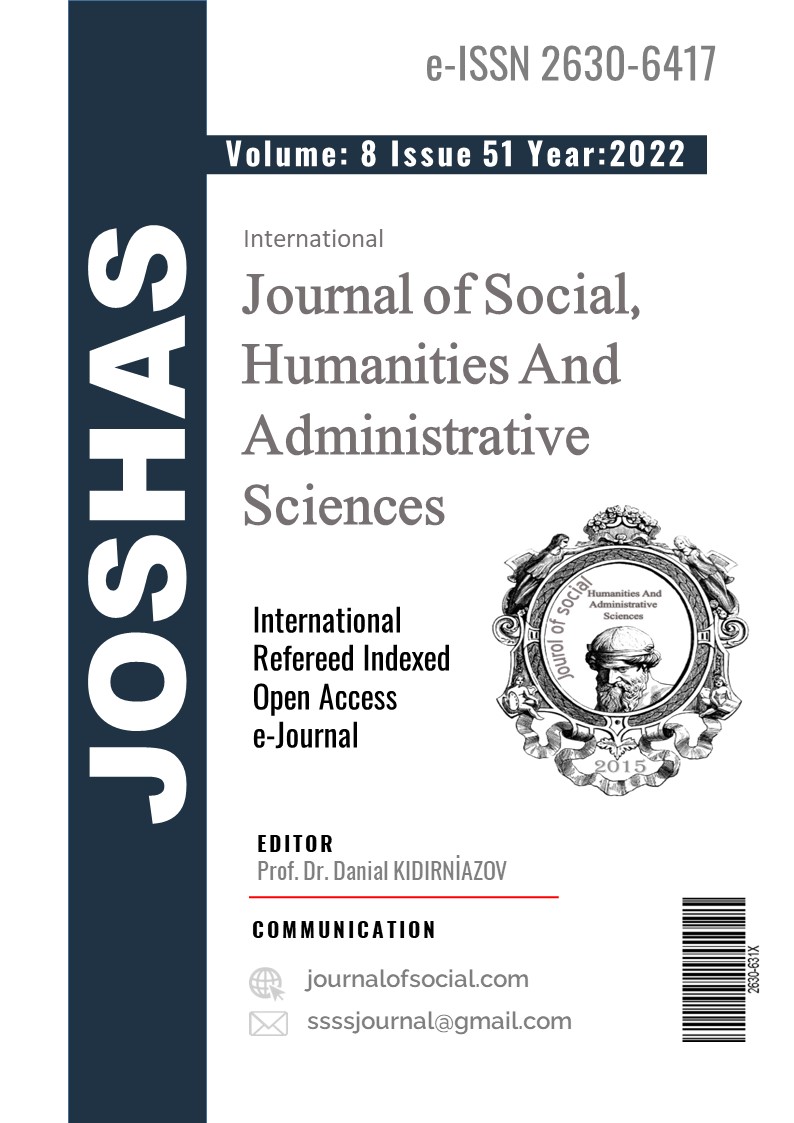PUBG Mobile Oyununun Ergenlerin Şiddet Eğilimleri Ve Saldırganlık Düzeyleri Üzerindeki Etkisinin İncelenmesi
Author :
Abstract
Günümüzde teknolojinin gelişmesiyle birlikte çocuğun gelişiminde çok önemi bir yere sahip olan oyunların sanal ortamlarda oynandığı, psikolojik ve biyolojik açıdan birçok etkisinin bilinmektedir. Bu kapsamda, bu çalışma PUBG mobile oyununun ergenlik dönemindeki bireylerin şiddet eğilimleri ve saldırganlık düzeyleri üzerindeki etkisini incelemek amacıyla yapılmıştır. Araştırmada nicel araştırmalardan tarama modeli kullanılmıştır. Araştırmaya katılan bireyler amaçsal örnekleme yöntemiyle belirlenmiştir. Kurum izni, öğrenci ve veli izni alınarak yapılan araştırmanın örneklemi, 2021-2022 eğitim öğretim yılında eğitim ve öğretimlerine devam eden 66 kız, 127 erkek olmak üzere 193 kişilik ergenlik dönemindeki bireylerden oluşmaktadır. Çalışmada katılımcıların özelliklerini belirlemek için Kişisel Bilgi Formu, katılımcıların şiddet eğilimlerini tespit etmek için Bayat ve Türkçapar (1995) tarafından geliştirilen Şiddet Eğilim Ölçeği ve katılımcıların saldırganlık düzeylerini belirlemek için Karataş ve Yavuzer (2006) tarafından geliştirilen Saldırganlık Ölçeği kullanılmıştır. Verilerin betimsel analizinde SPSS 23.00 programı kullanılmıştır. Araştırma sonucuna göre katılımcıların şiddet eğilimleri; PUBG oynama süreleri, PUBG oynarken kullanılan teknolojik araç ve PUBG oynanmadığında yaşanılan duygu değişkenine göre anlamlı düzeyde farklılaşmaktadır. Katılımcıların saldırganlık düzeyleri ise; PUBG oynama süreleriyle ve PUBG oynama nedenleri değişkenine göre anlamlı düzeyde farklılaşmaktadır.
Keywords
Abstract
Today, with the development of technology, many of the games that have many importance in the development of the child are known in virtual environments, psychological and biologically. In this context, this study was conducted to examine the effect of the PUBG Mobile game on the essentials of adolescence on violence trends and aggressiveness levels. The model of the scanning model was used in the study. Individuals participating in the study were determined by the aims method of purpose. The sample of the study conducted by taking a permission, student and guardian permission, the 66 girls, which continue their education and training in 2021-2022 education in education in 2021-2022, consists of individuals in adolescence of 193 people, 127 men. In order to determine the properties of the participants in the study, the aggression scale developed by Karataş and Yavuzer (2006), developed by Bayat and Türkçapar (1995) developed by Bayat and Türkçapar (1995) developed by Bayat and Türkçapar (1995) to determine the properties of the participants. The SPSS 23.00 program was used in the descriptive analysis of the data. Depreciation of the participants according to the research result; PUBG Play times, PUBG is a significant difference according to the variable of feeling when the technological vehicle and PUBG is not played while playing PUBG. If the participants' aggressiveness levels; PUBG is significantly different in terms of playing periods and pubg-playing reasons variable.
Keywords
- Ballard, M., Gray, M., Reilly, J. ve Noggle, M. (2009). Correlates of video game screen time among males: body
- Ballard, M., Gray, M., Reilly, J. ve Noggle, M. (2009). Correlates of video game screen time among males: body mass, physical activity, and other media use. Eat Behaviors, 10 (3), 161-167.
- Baldemir, H. ve Övür, A. (2021). Dijital oyun bağımlılığının yeni yüzü olarak Pubg mobile. Journal of Communication Science Researchs, 1 (2), 139-153
- Dinç, E. (2020). ‘‘Pubg mobile oyununun, sosyolojik, psikolojik, hukuki ve milli güvenlik açılardan incelenmesiraporu’’. (USMED, 2020). Erişim: 18 Aralık 2021. https://docplayer.biz.tr/219205387-Pubg-mobile-oyununun- sosyolojik-psikolojik-hukuki-ve-milli-guvenlik-acilardan-incelenmesi-raporu.html
- Eskidemir, S. ve Tezel, F. (2019). Teknoloji ile Büyüyen Çocuklar. Aygül, H.H. ve Eke, E. (Ed). Dijital Çocukluk ve Dijital Ebeveynler Dijital Nesillerin Teknoloji Bağımlılığı. Ankara: Nobel Yayıncılık.
- Engeser, S. (2012). Advances in flow research. New York: Springer Science Business Media.
- Foti, K. E., Eaton, D. K., Lowry, R. ve Mcknight-Ely, L. R. (2011). Sufficient sleep, physical activity, and sedentary behaviors, American Journal of Preventive Medicine, 41 (6), 596-602.
- Fullerton, S., Taylor, A. W., Grande, E. D. ve Berry, N. (2014). Measuring physical ınactivity: do current measuresprovide an accurate view of “sedentary” video game time?, Journal of Obesity, https://doi.org/10.1155/2014/287013.Karataş, Z. Ve Yavuzer, Y. (2016). Lise ve üniversite öğrencileri için kar-ya saldırganlık ölçeği geliştirilmesi vepsikometrik özelliklerinin incelenmesi. Mehmet Akif Ersoy Üniversitesi Sosyal Bilimler Dergisi, 8(17), 308-1321
- Gül, M. E. (2019). Kültür endüstrisi ürünü olarak dijital oyunlar: Playerunknown’s battlegrounds (Pubg) oyunu örneği. International Journal of Cultural and Social Studies, 5(2), 2458-9381.
- Johnson, D., Johnson, C., Scholes, L and Carras, M. C. (2013). Videogames and wellbeing: A comprehensive review. Melbourne: Young and Well CRC.
- Özkazanç, S. ve Esentürk, T. (2020). Sanal gerçeklik oyunlarındaki mekân algısı: Pubg oyunu örneği. Celal Bayar Üniversitesi Sosyal Bilimler Dergisi, 18 (Özel sayı), 308-320.
- Partington, S., Partington, E. ve Olivier, S. (2009). The dark side of flow: A qualitative study of dependence in big wave surfing. The Sport Psychologist, 23, 170-185.
- Savcı, M, ve Aysan, F. (2017). Teknolojik Bağımlılıklar ve Sosyal Bağlılık: İnternet Bağımlılığı, Sosyal MedyaBağımlılığı, Dijital Oyun Bağımlılığı ve Akıllı Telefon Bağımlılığının Sosyal Bağlılığı Yordayıcı Etkisi. Düşünen Adam The Journal of Psychiatry and Neurological Sciences. 30: 202-216.
- Yıldırım, Y. (2019). Dijital Yerlileri Tehdit Eden Teknoloji Bağımlılığı ve Siber Zorbalık Tehlikeleri.Aygül, H.H, &Eke, E. (Ed). Dijital Çocukluk ve Dijital Ebeveynler Dijital Nesillerin Teknoloji Bağımlılığı (ss. 61-86). İstanbul: Nobel Akademik Yayıncılık.
- Yüksel, M. (2012). The positive psychology of gaming: Immersion through flow in simulations. Journal of Internet and e-Business Studies, 2012, 1-10.
- Weinstein, A. M. (2010). Computer and video game addiction-a comparison between game users and non-game users. The American Journal of Drug and Alcohol Abuse, 36 (5), 268-276.
- Wood, R. T. A. (2008). Problems with the concept of video game “addiction”: some case study examples. International Journal of Mental Health and Addiction, 6 (2), 169-178.
- Wu, T. C., Scott, D. ve Yang, C. C. (2013). Advanced or addicted? Exploring the relationship of recreationspecialization to flow experiences and online game addiction. Leisure Sciences: An Interdisciplinary Journal, 35 (3), 203-217.





